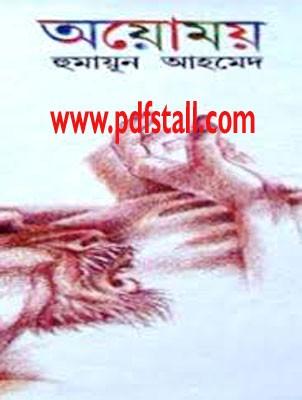
Book Title: Ayomoy
Author(s): Humayun Ahmed
Category: Humayun Ahmed
Publisher: Anupam Prakashany, Year: 1990
Total pages: 64
Size: 10MB
Book Details:
Ayomoy is a classic Bengali novel written by renowned Bangladeshi author Humayun Ahmed. Published in 1991, this novel is considered to be one of Ahmed’s most famous works, and has been widely acclaimed for its vivid portrayal of life in rural Bangladesh and its exploration of themes such as love, family, and identity.
The novel is set in a small village in Bangladesh, and follows the story of two childhood friends, Ayub and Moyna. The two friends grow up together and form a close bond, but as they reach adulthood, they each take different paths in life. Ayub becomes a successful businessman, while Moyna remains in the village and marries a local farmer. Despite their different lifestyles, the two friends continue to maintain their close relationship, and when Ayub visits the village, they are soon caught up in a complex web of emotions and memories.
One of the central themes of Ayomoy is the idea of love and the different forms that it can take. The novel explores the love between Ayub and Moyna, and shows how their friendship and relationship evolves over time. The novel also explores the idea of familial love, showing how the relationships between parents and children, brothers and sisters, and husbands and wives can be both fulfilling and challenging.
Another key theme of the novel is identity, and the different factors that shape our sense of self. The novel explores the ways in which our past experiences, our relationships, and our cultural background can influence our sense of identity. It also examines the ways in which our perceptions of others can be shaped by our own experiences and perspectives, and how this can impact our relationships.
The novel is notable for its vivid portrayal of life in rural Bangladesh, and its depiction of the daily struggles and triumphs of the villagers. Ahmed’s writing is characterized by its simplicity and elegance, and he captures the rhythms and sounds of rural life with great precision. He also provides a nuanced and complex picture of the social and economic changes taking place in rural Bangladesh at the time, and explores the ways in which these changes are affecting the lives of the villagers.
Humayun Ahmed’s writing has been widely acclaimed for its ability to evoke strong emotions and to connect with readers on a deep level. In Ayomoy, he uses his powerful writing style to explore the complexities of human relationships and the ways in which our experiences and perspectives can shape our sense of self. The novel is a moving and powerful meditation on love, identity, and the human experience, and remains one of Ahmed’s most beloved works to this day.
In conclusion, Ayomoy is a classic novel that explores the themes of love, identity, and the human experience. Through its vivid portrayal of life in rural Bangladesh and its exploration of the complexities of human relationships, the novel provides a nuanced and powerful meditation on the human condition. With its vivid writing style, deep emotional resonance, and timeless themes, Ayomoy remains a must-read for anyone interested in the literature of Bangladesh and the wider world.